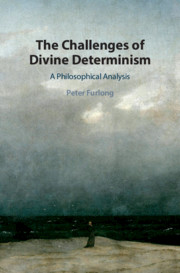Book contents
- The Challenges of Divine Determinism
- The Challenges of Divine Determinism
- Copyright page
- Dedication
- Contents
- Acknowledgments
- Introduction
- Chapter 1 A Primer on Divine Determinism
- Chapter 2 Divine Determinism and Free Will
- Chapter 3 Divine Determinism and Free Will
- Chapter 4 Divine Determinism and the Author of Sin Objection
- Chapter 5 Divine Determinism and the Blameworthiness Objection
- Chapter 6 Divine Determinism and the Free Will Defense
- Chapter 7 God, Determined Agents, and Love
- Chapter 8 Divine Commands, the Divine Will, and Divine Blame
- Conclusion
- References
- Index
Chapter 2 - Divine Determinism and Free Will
The Consequence Argument
Published online by Cambridge University Press: 07 June 2019
- The Challenges of Divine Determinism
- The Challenges of Divine Determinism
- Copyright page
- Dedication
- Contents
- Acknowledgments
- Introduction
- Chapter 1 A Primer on Divine Determinism
- Chapter 2 Divine Determinism and Free Will
- Chapter 3 Divine Determinism and Free Will
- Chapter 4 Divine Determinism and the Author of Sin Objection
- Chapter 5 Divine Determinism and the Blameworthiness Objection
- Chapter 6 Divine Determinism and the Free Will Defense
- Chapter 7 God, Determined Agents, and Love
- Chapter 8 Divine Commands, the Divine Will, and Divine Blame
- Conclusion
- References
- Index
Summary
In this chapter I begin consideration of the claim that divine determinism undermines human free will. I begin with Peter van Inwagen’s Consequence Argument. This argument claims that since humans have no choice about the distant past and the laws of nature—which together determine human actions—humans likewise have no choice about any of their own actions. I argue that although some divine determinists are not threatened by this argument, a revised version of this argument does pose a threat to all divine determinists. This revised argument maintains that since humans have no choice about divine determining activity, they likewise have no choice about their own actions, which are determined but it. After laying out this revised argument, I consider several possible responses to it. In particular, I consider the reply that God’s unique causal activity allows actions to be determined while remaining contingent and the reply that divinely determined agents possess the highest sort of ability to do otherwise that is coherent. I argue that both replies fail, and briefly consider other options for the divine determinist, including semi-compatibilism and hard divine determinism.
Keywords
- Type
- Chapter
- Information
- The Challenges of Divine DeterminismA Philosophical Analysis, pp. 34 - 59Publisher: Cambridge University PressPrint publication year: 2019

